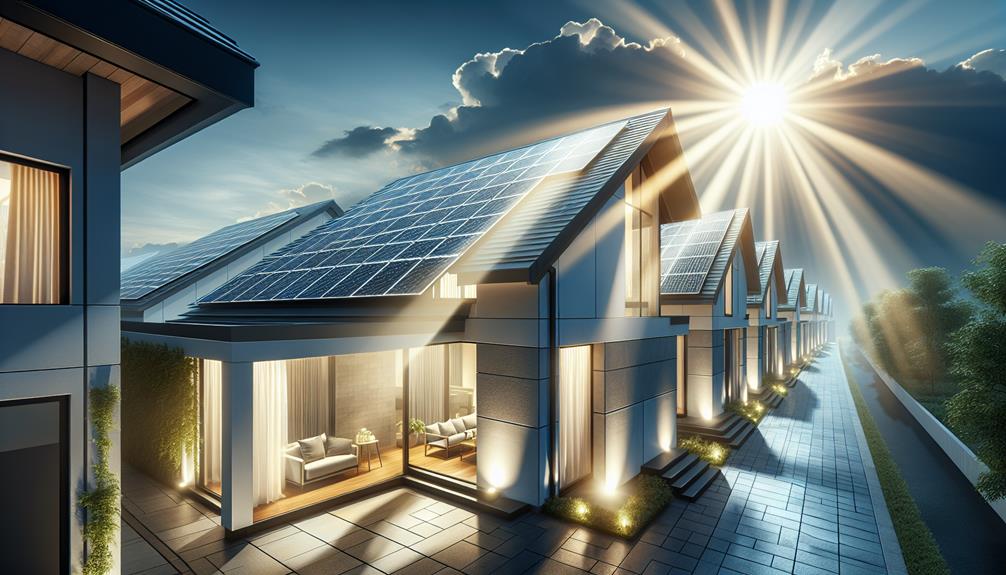Can You Really Make Money With Solar Panels
Are solar panels really a viable way to make money? You may have heard the claims and seen the success stories, but is it really possible to earn a profit from harnessing the power of the sun?
Can You Really Make Money With Solar Panels
Well, the truth is, it's not as simple as a yes or no answer. There are several factors to consider, from government incentives to long-term savings.
Can You Really Make Money With Solar Panels
In this discussion, we'll explore the potential financial benefits of solar panels, leaving you with a clearer understanding of whether or not they can truly put money in your pocket.
Can You Really Make Money With Solar Panels
The Benefits of Solar Panels
Can You Really Make Money With Solar Panels
Save money and reduce your carbon footprint by installing solar panels on your property. Not only will you contribute to a greener future, but you'll also enjoy a range of benefits that come with harnessing the power of the sun.
Can You Really Make Money With Solar Panels
First and foremost, installing solar panels allows you to produce your own clean energy. By generating electricity from a renewable source, you become less reliant on fossil fuels and contribute to the fight against climate change. This sense of environmental responsibility will help you feel connected to a community of like-minded individuals who are also striving to make a positive impact.
Can You Really Make Money With Solar Panels
Additionally, solar panels can save you money on your energy bills. By generating your own electricity, you can significantly reduce or even eliminate your reliance on the grid. This means lower monthly expenses and increased control over your energy costs. Imagine the sense of belonging that comes from being able to manage your own energy consumption and reduce your dependency on traditional energy providers.
Can You Really Make Money With Solar Panels
Moreover, installing solar panels can increase the value of your property. Studies have shown that homes equipped with solar panels tend to sell faster and at higher prices than those without. This means that not only will you benefit financially from the savings on your energy bills, but you'll also see a return on your investment should you decide to sell your property in the future.
Government Incentives and Rebates
By harnessing the power of the sun and installing solar panels on your property, you can take advantage of various government incentives and rebates that can further enhance the financial benefits of your clean energy investment.
The government recognizes the importance of renewable energy and offers programs to encourage its adoption. One such program is the Federal Investment Tax Credit (ITC), which allows you to claim a percentage of the cost of your solar panel system as a tax credit. This means that you can deduct a significant portion of your installation expenses from your federal taxes.
Additionally, many states and local governments offer their own incentives and rebates for renewable energy installations. These can include cash rebates, grants, or even property tax exemptions. These incentives can help offset the upfront costs of installing solar panels, making it more affordable and accessible for homeowners like you.
Furthermore, by participating in these government programs, you're contributing to the larger goal of reducing carbon emissions and building a sustainable future for all. So, not only can you save money, but you can also feel a sense of belonging to a community that's actively working towards a cleaner and greener planet.
Net Metering and Feed-in Tariffs
Net metering and feed-in tariffs play a crucial role in maximizing the financial benefits of solar panel installations. These policies enable you to not only save money on your electricity bills but also potentially earn income from your solar system.
Net metering allows you to offset your energy consumption by exporting excess electricity generated by your solar panels back to the grid. When your solar panels produce more electricity than you need, the excess is fed back to the grid and you receive credits for the energy you contribute. These credits can then be used to offset the cost of the electricity you consume when your panels aren't producing enough energy, such as during nighttime or cloudy days. By taking advantage of net metering, you can significantly reduce your electricity bills and potentially even eliminate them entirely.
Feed-in tariffs, on the other hand, are government incentives that provide a fixed payment for every kilowatt-hour of electricity your solar panels generate. This means that in addition to saving on your electricity bills, you can also earn money by selling the excess electricity you produce back to the grid. Feed-in tariffs provide a guaranteed income for a specified period, usually between 10 to 25 years, making solar panel installations a long-term investment with a steady return.
Both net metering and feed-in tariffs provide financial incentives that make investing in solar panels a smart choice. These policies encourage solar energy adoption, reduce reliance on fossil fuels, and contribute to a more sustainable future. So not only can you save money with solar panels, but you can also contribute to a cleaner and greener environment.
Selling Excess Energy Back to the Grid
Maximizing the financial benefits of solar panel installations not only involves taking advantage of net metering and feed-in tariffs but also involves selling excess energy back to the grid. This is an excellent way for you to make money while also contributing to a sustainable future. By generating more electricity than you consume, you have the opportunity to sell the surplus energy to your utility company, who'll then distribute it to other customers in need. Not only does this help you offset your own electricity costs, but it also allows you to earn credits or cash for the excess energy you produce.
Selling excess energy back to the grid is a win-win situation. Not only does it allow you to make some extra money, but it also helps promote the use of renewable energy sources. By participating in this program, you become an active contributor to the clean energy movement, creating a sense of belonging to a community that values sustainability and environmental responsibility.
To sell excess energy back to the grid, you'll need a bi-directional meter installed. This meter measures both the electricity you consume from the grid and the excess electricity you generate. The utility company will then credit your account or pay you for the excess energy based on their established rates. It's important to check with your local utility company to understand their specific policies and procedures for selling excess energy back to the grid.
Long-Term Savings and Return on Investment
One way to ensure long-term savings and a solid return on investment with solar panels is by carefully monitoring your energy consumption. By keeping track of your energy usage, you can identify areas where you can reduce wastage and become more efficient, ultimately saving money on your utility bills. This practice not only helps you lower your electricity costs but also maximizes the benefits of your solar panel system.
In addition to monitoring your energy consumption, it's important to consider the long-term savings potential of solar panels. While the initial investment may seem significant, the savings you can achieve over the lifespan of the system can be substantial. Solar panels have a long lifespan, typically around 25 years or more, and during this time, you can significantly reduce or even eliminate your electricity bills. This means that the money you save on energy costs can be used for other purposes, such as paying off the initial investment or funding other home improvement projects.
Moreover, solar panels also offer a solid return on investment. Not only do they provide ongoing savings on your electricity bills, but they can also increase the value of your property. Studies have shown that homes with solar panels tend to sell faster and at a higher price than homes without them. This means that if you decide to sell your home in the future, you can potentially recoup a significant portion of your initial investment.
Frequently Asked Questions
What Are the Upfront Costs of Installing Solar Panels?
Installing solar panels requires upfront costs for equipment, installation, and permits. However, these expenses can be offset by long-term savings on electricity bills and potential income from selling excess energy back to the grid.
How Long Does It Take to Recoup the Initial Investment in Solar Panels?
It typically takes around 7-20 years to recoup your initial investment in solar panels. However, after that, you can start making money by selling excess electricity back to the grid.
Are There Any Maintenance Costs Associated With Owning Solar Panels?
Yes, there are maintenance costs associated with owning solar panels. However, with proper care and regular inspections, you can keep these costs low and maximize the financial benefits of your solar investment.
What Happens if My Solar Panels Produce More Energy Than I Consume?
If your solar panels produce more energy than you consume, you can actually make money by selling the excess electricity back to the grid. This can result in a credit on your utility bill or even a check from your utility company.
Can Solar Panels Increase the Value of My Home?
Solar panels can increase your home's value by providing energy savings and potential income from selling excess electricity. They are seen as an eco-friendly and cost-effective investment, making your property more attractive to potential buyers.
Conclusion
So, can you really make money with solar panels?
The answer is a resounding yes! While there may be some initial costs involved, the benefits, government incentives, and long-term savings make it a worthwhile investment.
And don't worry about not having enough sunlight – even on cloudy days, solar panels can still generate electricity.
So go ahead, make the switch to solar and start reaping the financial rewards while also helping the environment.

